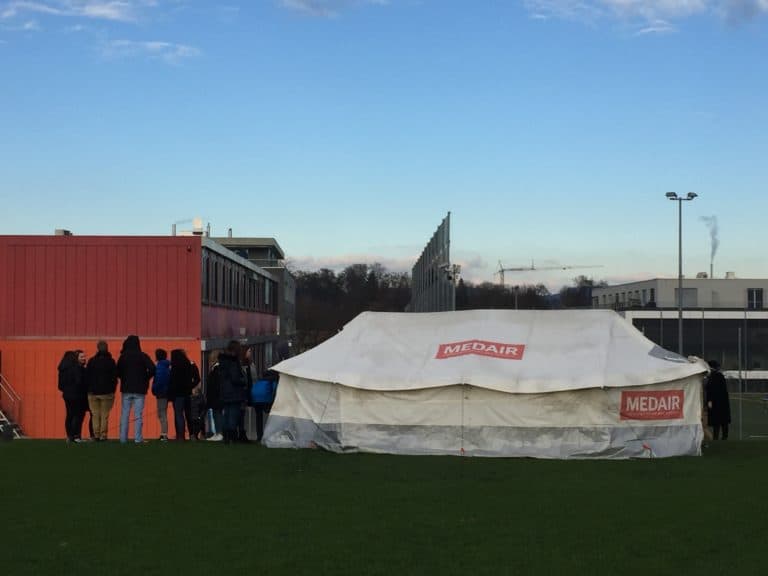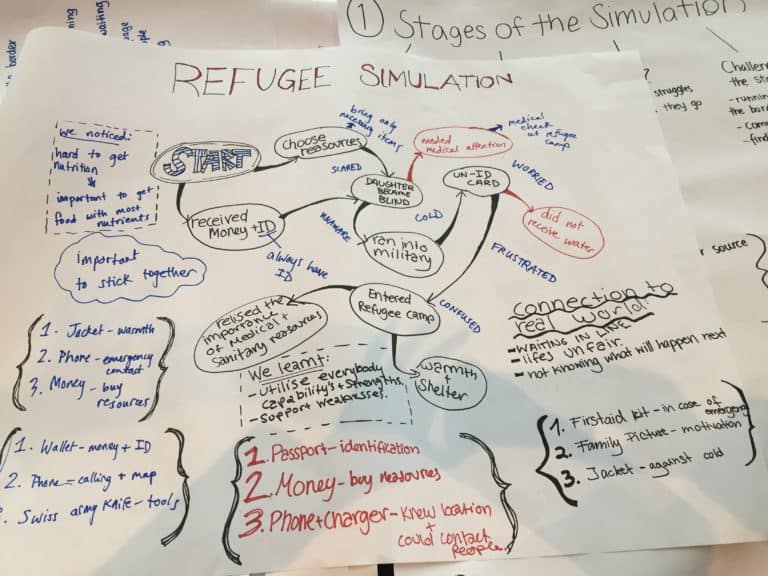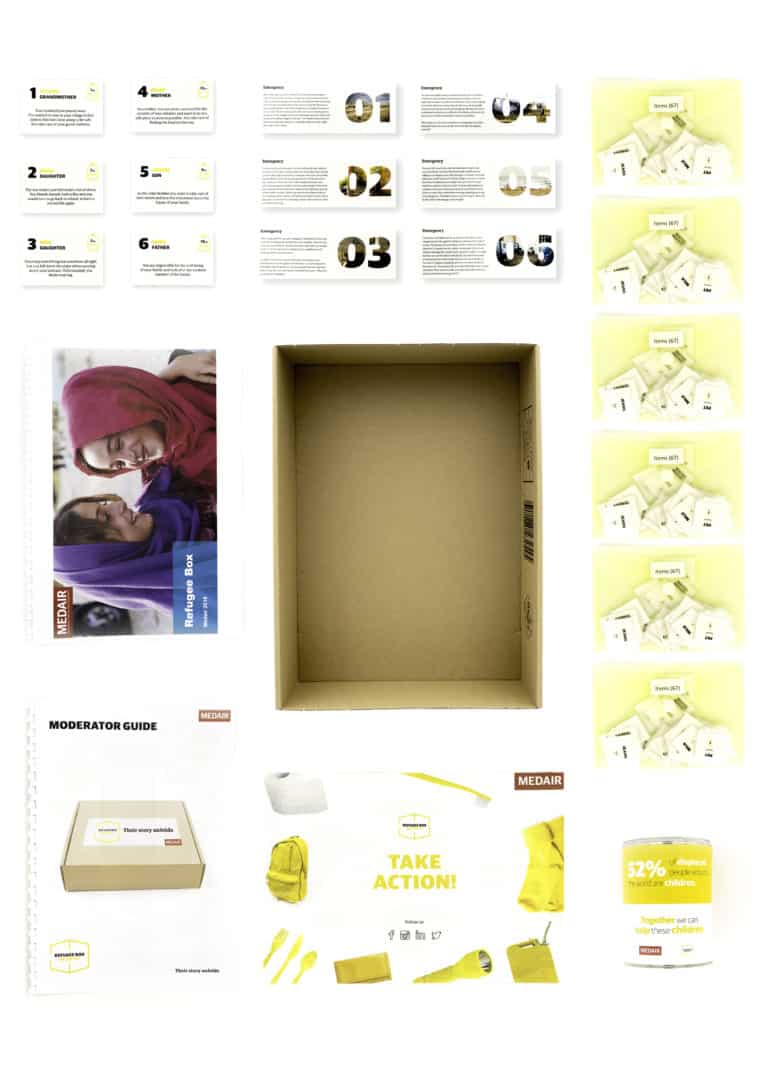Creating a culture of caring – Why developing empathy is a vital part of education

Every parent wants to see their child succeed. That’s why investing in a great education is a top priority for parents of children of all ages. For some parents, they imagine their child succeeding in a professional sphere, perhaps leading a company or performing a surgery. For others, they imagine their children succeeding socially and developing the skills to communicate well with others and get ahead.
But what if the first thing that came to our minds when we dreamed of our children’s futures was less measurable than grades, accolades or social currency? What if instead, we imagined them as young adults walking into their futures carrying two very important tools. A global mind and a generous heart. How would this shape their future and opportunities? How would it impact our world?
What is a culture of caring and why does it matter?
A culture of caring is a learning environment that upholds the dignity of all. It also emphasises the development of empathy for others. It creates space for different experiences and sees these differences as opportunities to help one another reach their potential. Developing a culture of caring in our schools is both an opportunity and a necessity.
“A completely reasonable question is to ask what education is for,” says Frazer Cairns, Director of International School of Lausanne. “And if we do, we need to think about the kind of future society we want to live in and the kind of values we want people to uphold.
“Seen in this light, the purpose of an education is not to prepare young people to join the workforce or to prepare them for university. These are just steps along the way rather than a destination in themselves. The ultimate purpose of an education is to help them become wiser, and better, individuals. We certainly need society to be creative and innovative but we also need it. Or rather the people that make up society. To have a sense of responsibility for others and a sense of duty.”
How a culture of caring can impact children’s futures and the future of our world
Most of the cultural messages we receive today centre around one theme — us. What can simplify our lives? How can we improve our lives? How can we achieve success? While there is nothing wrong with pursuing self-improvement or setting and achieving individual goals, we often lack messages that encourage the extension of empathy, love, or service to one another. This messaging has an effect on our young people and what they learn to believe as valuable pursuits in life.
Frazer Cairns continues, “If young people do not learn to respect and actively support the dignity of others, then the future of our planet is, in my opinion, very bleak and chaotic. A core aspect of education is to help young people develop the confidence and the energy to work towards what they have recognised to be right.
“Clearly I hope that schools will help produce extraordinary people; people who will take an issue by the horns and shake up the world. However, I hope too that those same schools and colleges will help to produce a far greater number of nurses, carers in old people’s homes, loving parents, and supportive friends who recognise that their collective compassionate acts could have a far greater and much longer-lasting effect.”
Becoming Globally Minded
When young minds are exposed through education to the needs of others in our world, both near and far, we can expect them to become more globally-minded and well-rounded thinkers and feelers. What we may not consider, is how it can help them to actually find their unique place in it.
American writer Frederick Buechner defines vocation as, “the place where your deep gladness and the world’s deep hunger meet.” Instilling a sense of empathy in our students sets them on a path to pursue vocation rather than merely occupation. It reframes the question passed down from generations: “What will you be when you grow up?” to, “What problem do you wish to solve in the future?” When students are free to pursue vocation rather than occupation, they develop a deep sense of purpose in their work and private life and learn to take delight in being generous with the time and talents. More so, developing an empathetic and caring character is also proven to improve health and self-confidence and reduce anxiety; issues many parents are concerned about today.
Opening young eyes to the world
For more than five years, the Swiss humanitarian organisation, Medair, has been partnering with international schools in Switzerland to help educate young minds about the needs of people affected by natural disaster and armed conflict in some of the world’s most isolated and vulnerable places. Based near Lausanne, Medair has been welcomed into international schools, including Zurich International School, St. George’s International School, GEMS World Academy, The International School of Zug and Luzern, La Côte International School and International School of Lausanne to facilitate real-life learning activities that bring world issues right into the classroom.
Lorretta Cuff, Medair’s Educational Community and Outreach Officer for French-speaking Switzerland, explains. “Our goal is to encourage students to be more aware and empathetic to the needs of others. We also want them to take positive action to help through fundraising and awareness raising.
“To achieve this, we offer turn-key programmes ranging from classroom-based activities to student-driven projects from the primary to diploma level. We provide resources for teacher-led sessions and also offer classroom visits to schools interested in becoming more involved in a wide range of global topics affecting our world’s poorest and most vulnerable people. These resources help make these topics come to life and help to educate and engage students with social causes.”
Learning about the Plight of Refugees
Through these resources, students across Switzerland have learned about the plight of refugees through a simulated learning experience, exposing students to the same difficult decisions refugees must make daily to survive. Other students have benefited from lectures by humanitarian workers working on the frontlines of crises. Such crises have included the Ebola outbreak in West Africa. More students have learned how their talents can intersect with social justice. This was the case for art students from the International School of Zug and Luzern who created a class project that advocated and also, raised funds for global issues including poverty-alleviation and food scarcity.

“We help students realise that they can harness their skills and talents for the good of others. This is ultimately good for them too”. Adds Manon Blaufelder, Deputy Manager of Medair’s Zurich office.
Barry Dequanne, Director of International School of Zug and Luzern, found the immersion activities particularly meaningful to his students. “The opportunity to involve students in a simulation event rather than simply presenting to them was extremely powerful as a learning experience. Feeling what a refugee would feel and walking in someone else’s shoes enabled the students to better understand what refugees have to go through. It has therefore helped them to develop a deeper sense of empathy. Such an experiential learning opportunity enriched the discussions about migration that had been going on within our classrooms. It has also helped our students to understand and empathise.”

Equipping students to be change-makers
“I believe there is a yearning for purpose among young people. An eagerness to know what they can do to help tackle the issues they see in the world around them”. Says Medair CEO, David Verboom. “We are grateful to have the opportunity to encourage this global mindset and offer them tangible and simple solutions to making a difference in their world.”
With a great education, it’s safe to assume that our young people will be well equipped to becomes great teachers and lawyers. But if we assist them in developing a generous heart, they can have great with great impact too.
For more information or to bring these life-changing resources to your school or service group, please contact: in*********@****ir.org or learn more at: https://www.medair.org/schools/.
If you are interested in building your child’s empathy right at home, consider the Refugee Box. The Refugee box is a card-based activity, which can be easily set up around your kitchen table. Through stories, videos and role playing, the whole family can gain a deeper understanding of the plight of refugees.

WHO IS MEDAIR?
Medair is a Swiss humanitarian organisation inspired by Christian faith to relieve human suffering in some of the world’s most remote and devastated places. www.medair.org
WHAT DO THEY DO?
Medair sends experts in health, shelter, and water to help families meet their most urgent needs quickly during emergencies. They then stay to help people recover and safeguard against future disasters.
WHERE DO THEY WORK?
Medair is active in 12 countries responding to major disease outbreaks, aiding survivors of natural disasters, and helping refugees affected by on-going conflict.

More from International School Parent
Find more articles like this here: www.internationalschoolparent.com/articles/
Want to write for us? If so, you can submit an article for consideration here: www.internationalschoolparent.submittable.com
